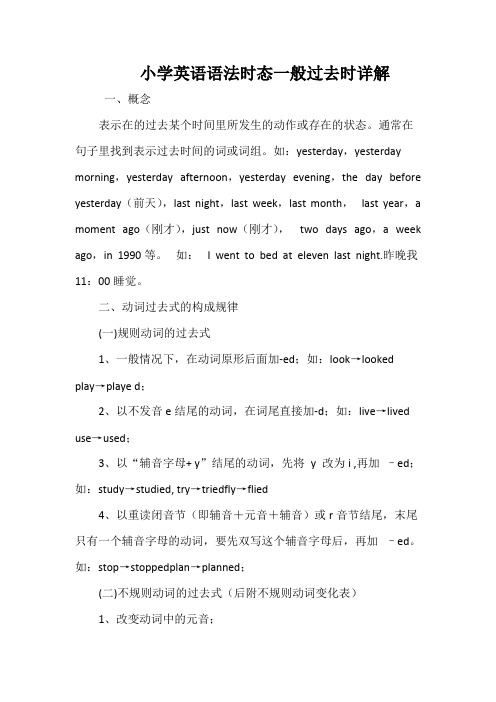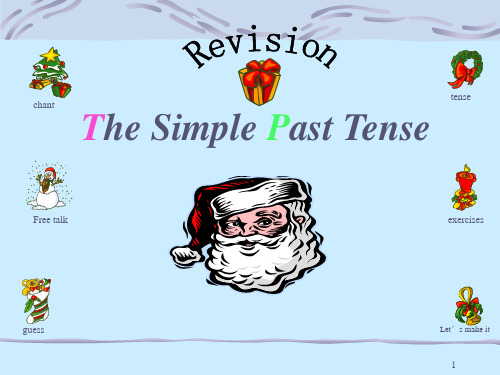小学英语语法系列微课 一般过去式复习
小学英语语法知识讲解(一般过去时)

一般过去时的概念
一般过去时表示过去某个时间发生的动作或 存在的状态。 常和表示过去的时间状语连用。 如:last year, yesterday等;yesterday morning, one day,last year,two days ago, two hours ago, the day before yesterday, last week, last(year, night, month…),
例如: I saw him in the street yesterday. 昨天我在街上看见他了。 Li Mei always went to school on foot last year. 去年李梅总是步行上学。
动词过去时的构成
动词过去式的构成: 规则动词过去式的构成有四条规则: 一般在动词原形末尾直接加上-ed。如:look-looked。 以不发音的字母e结尾的动词,去e再加-ed。如:live-lived。 末尾只有一个辅音字母的重读闭音节,先双写这个辅音字母,再加-ed。如:stop-stopped。
含有be动词的句型结构
主语+BE+表语. 否定式: 主语+BE(am is are)+NOT+ 表语. 疑问式: BE(Am Is Are)+主语 +表语?
一般现在时: 肯定式:
肯定式: 主语+BE+表语. 否定式: 主语+BE(was were)+NOT+表语. 疑问式: BE(Was Were)+主语 +表语?
Sam_____ (do) the housework yesterday. ______(do) you _______(enjoy) yourself yesterday? ______(do)you _________(play) the violin in the artroom yesterday? No, I didn't. I_____(draw)some pictures there. . I ______ (eat) a big pizza yesterday. There____ (be) many sheep on the farm last year.
一般过去时.语法讲解PPT

一般过去时常用的时间状语包括过去的时间点、过去的时间段 等,而过去完成时常用的时间状语包括“已经”、“之前”等
。
05
一般过去时的练习与巩固
填空练习
总结词
填空练习是巩固一般过去时的有效方法,通过在句子中留空,让学生填写正确的动词时态,加深对一般过去时的 理解和运用。
详细描述
在填空练习中,教师可以选择一些包含一般过去时的句子,故意去掉动词时态部分,让学生根据上下文语境和时 态规则填写正确的时态。例如,“Yesterday, I ____(go) to the park with my family. We ____ (have) a great time.” 学生应该填写“went”和“had”。
表示过去的习惯或经常发生的动作
描述过去的习惯
一般过去时可以用来描述过去经常发 生的动作或习惯,例如“He used to smoke a pack of cigarettes a day” (他以前每天抽一包烟)。
描述过去的频率
一般过去时可以用来表示过去某个时间 段内发生的动作的频率,例如“We met every week”(我们每周见面一 次)。
一般过去时表示动作已经完成,而过去进行时则表示动作正在进行中。
总结词
时间状语不同
详细描述
一般过去时常用的时间状语包括过去的时间点、过去的时间段等,而 过去进行时常用的时间状语包括“当时”、“正在”等。
与过去完成时混淆的用法
总结词 详细描述
总结词 详细描述
动作是否完成
一般过去时表示动作已经完成,而过去完成时则表示在过去的 某个时间点之前已经完成的动作。
选择练习
总结词
选择练习是一种常见的练习方式,通过提供多个选项,让学生选择符合语境和语法规则的答案,进一 步巩固一般过去时的运用。
英语一般过去时语法知识归纳总结

英语一般过去时语法知识归纳总结英语的一般过去时是用来表示发生在过去的动作、事件或状态。
在使用一般过去时时,我们需要注意动词的变化规则、时间状语的使用以及动作的描述。
一、动词的变化规则一般过去时中,动词的变化分为两种情况:一是一般动词的变化,二是不规则动词的变化。
1. 一般动词的变化一般动词在一般过去时中,大部分动词都需要加上-ed结尾来表示过去时。
例如:- walk → walked- play → played- study → studied在一些情况下,一般动词的末尾只需要加上-d结尾即可,以保持读音的规则。
例如:- love → loved- live → lived此外,一些以辅音字母+y结尾的动词,在变为过去时时需要把y变为i,并加上-ed结尾。
例如:- try → tried- carry → carried2. 不规则动词的变化不规则动词在一般过去时中的变化不遵循规则,需要记忆其特定的形式。
例如:- go → went- eat → ate- see → saw二、时间状语的使用时间状语可以用来表示动作发生的具体时间,在一般过去时中,使用不同的时间状语可以帮助我们更准确地描述过去的动作或事件。
例如:- yesterday(昨天)- last week(上周)- in 2005(在2005年)- when I was a child(当我还是个孩子时)三、动作的描述在使用一般过去时时,我们需要注意动作的描述,尽量使用简洁明了的语句来表达过去发生的事情。
同时,可以使用连词和逻辑词语来连接不同的句子,使文章更加连贯。
例如:- I went to the park yesterday. It was a sunny day.- We played football last week, but we lost the game.总结:英语一般过去时是用来表示过去发生的动作、事件或状态。
动词的变化规则分为一般动词和不规则动词两种情况,需要根据动词的不同形式来变化。
(完整)小学英语语法时态一般过去时详解

小学英语语法时态一般过去时详解一、概念表示在的过去某个时间里所发生的动作或存在的状态。
通常在句子里找到表示过去时间的词或词组。
如:yesterday,yesterday morning,yesterday afternoon,yesterday evening,the day before yesterday(前天),last night,last week,last month,last year,a moment ago(刚才),just now(刚才),two days ago,a week ago,in 1990等。
如:I went to bed at eleven last night.昨晚我11:00睡觉。
二、动词过去式的构成规律(一)规则动词的过去式1、一般情况下,在动词原形后面加-ed;如:look→looked play→playe d;2、以不发音e结尾的动词,在词尾直接加-d;如:live→lived use→used;3、以“辅音字母+ y”结尾的动词,先将y 改为i ,再加–ed;如:study→studied, try→triedfly→flied4、以重读闭音节(即辅音+元音+辅音)或r音节结尾,末尾只有一个辅音字母的动词,要先双写这个辅音字母后,再加–ed。
如:stop→stoppedplan→planned;(二)不规则动词的过去式(后附不规则动词变化表)1、改变动词中的元音;begin→began drink→drank come→came eat→ate grow→grew run→ran know→knew win→wonspeak→spoketake→took write→wrote get→got2、变词尾的–d 为–t ;build→built lend→lent send→sent spend→spent bend→bent3、与动词原形一样;cut→cut put→put cost→cost hurt→hurt shut→shut4、变-ay 为-aid (少数动词);say→said pay→paid lay→laid5、采用不同词根;sell→sold teach→taught buy→bought6、其他。
小学英语一般过去时态讲解及习题ppt课件

A: What day_i_s_ it today ? B: It _is_ Sunday. A: What day _w_a_s_it yesterday?B: It_w_a_s_Saturday. A: What day _w_a_s_ it the day before yesterday ?
39
It was sunny.
The vacations were great .
How was the weather ? How were the vacations ?
I did my homework yesterday.
What did you …do…?
She played soccer last Sunday.
Did they have…?
My father went to the beach three years ago.
Did your father go…?
Tom and Jack studied for the test three days
ago. Did Tom and Jack study…?
I did my homework yesterday.
Did you do…?
Sshe play…?
He cleaned his room last week.
Did he clean…?
They had a summer camp last weekend.
What did she …do…?
30
Exercise 1. _W_e_r_e_(be) you busy yesterday afternoon? 2. She _w__a_s _ (be) at school this morning. 3. Jane and Ann w__er_e_n_’(tbe not) friends before. 4. He _d_i_d_n_’(tdo not) live in Guangzhou
小学一年级英语一般过去时的语法学习

小学一年级英语一般过去时的语法学习一、什么是一般过去时?一般过去时表示过去发生的动作或状态,通常使用过去式动词来表达。
比如:•I ate breakfast at 7 am this morning.•She played basketball with her friends yesterday.二、一般过去时的构成一般过去时的构成主要取决于动词的不规则变化规则。
通常来说,动词加上-ed就可以构成过去时。
但是也有很多不规则动词需要我们特别注意。
下面是一些表示不规则变化的动词:•be -> was/were•have -> had•go -> went•eat -> ate•see -> saw•do -> did•etc.三、使用一般过去时的语境1.过去发生的事情当我们表达过去发生的事情时,通常要使用一般过去时。
示例:•We went to the park last Sunday.•She studied English hard for the test.2.过去的经历当我们讲述自己或别人的过去经历时,也要使用一般过去时。
示例:•When I was six years old, I lived in a small village.•My grandfather traveled around the world when he was young.3.过去的习惯当我们谈论过去的习惯或常态时,也要使用一般过去时。
示例:•She always walked to school when she was a child.•We usually ate dinner at home every day.四、注意事项1.一些不规则动词的过去时形式需要特别记忆,例如go->went,see->saw等。
2.有些动词在过去式和现在分词时形式相同,但是用法不同,例如read。
小学英语时态之 一般过去时讲解课件ppt
一般过去时:
定义: 一般过去时,是表示过去某一时刻或某一段时间内发生的动作或存在
的状态。
标志词: yesterday, just now, …ago, last…, this morning …
结构: 谓语是be动词
谓语是行为动词
肯定句: 主语+ was/were + 其他 否定句: 主语+ was/were + not + 其他 一般疑问句: Was/Were + 主语+其他? 肯定句: 主语+ 动词的过去式 + 其他 否定句: 主语+ didn’t +动词原形 + 其他 一般疑问句:Did + 主语+ 动词原形 +其他?
at the weekends this morning often
usually
last Mid-Autumn Festival
every day three days ago on Mondays
tomorrow a moment ago 14 years ago
找出表示一般过去时的时间副词。
( B) 1. My mother had breakfast and____to work.
A. go B. went C. going D. to go
( A)2. -- How __ your vacation?
-- It was pretty good. A. was B. were C. did D. do
( )3.Each student one picture.
A.draw B. draws C. drawing D.to drawing
小学四年级英语语法一般过去时知识点
小学四年级英语语法一般过去时知识点-四年级
在中国,英语也是一门主要的课程,与语文数学并列,是求学者永远离不开必学的一门课程。
接下来,和一起来练习英语语法。
四年级英语语法知识点:一般过去时
1一般过去时表示过去某个时间发生的动作或存在的状态,常和表示过去的时间状语连用。
一般过去时也表示过去经常或反复发生的动作感谢。
动词在一般过去时中的变化:
⑴am和is在一般过去时中变为waswas not=wasn’t
⑵are在一般过去时中变为werewere not=weren’t
⑶带有was或were的句子,其否定、疑问的变化和is, am,
are一样,即否定句在was或were后加not,一般疑问句把was或were调到句首。
动词的一般过去时的句子
否定句:didn’t 动词原形,如:Jim didn’t go home yesterday
一般疑问句:在句首加did,句子中的动词过去式变回原形。
如:Did Jim go home yesterday
特殊疑问句:
⑴疑问词did主语动词原形
如:What did Jim do yesterday
⑵疑问词当主语时:疑问词动词过去式
如:Who went to home yesterday
为大家整理的四年级英语语法知识点就到这里,更多小学生辅导相关内容请随时关注!。
英语语法——一般过去时课件(共44张PPT)
肯否回答:
一般疑问句: Be动词(was/were)+主语+其他+?
肯定回答:Yes , 主语+ was/were. 否定回答:No , 主语+ wasn’t/weren’t . --- Was he at home yesterday ? ---他昨天在家吗? --- Yes , he was .是的,他在 --- No , he wasn’t . 不,他不在。
study — studied
carry— carried
5.不规则变化. (见不规则动词表P97)
be动词 的一般过去时
Please look at the sentences
我今年12岁. I _a_m_ 12 years old this year.
我去年11岁. I _w_a_s_ 11 years old last year.
实意动词的一般 过去时句子结构
每天,早餐我吃鸡蛋和牛奶。 I _h_av_e_ eggs and milk for breakfast every morning.
昨天,早餐我吃面条。
I _h_a_d_ noodles for breakfast yesterday morning.
他每天都吃水果。 He _h_a_s__ fruit every day.
1. I _______ at school now.
was 2. He ________ at the camp last week. were 3. We ________ students two years ago. were 4. They ________ on the farm a moment ago. was 5. Yang Ling ________ eleven years old last year. was 6. There ________ an apple on the plate yesterday. was 7. There ________ some milk in the fridge yesterday. was 8. The mobile phone _______ on the sofa yesterday evening.
小学英语一般过去时知识点总结
小学英语一般过去时知识点总结一、用法1.表示过去发生的动作或状态。
There was a good boy.有一个好孩子。
(was表示状态)He painted gold with the magic paintbrush.他用神笔画出了金子。
(实义动词paint表示动作)二、动词过去式1.动词be--was were2.动词have,has--had3.助动词do,does--did4.行为动词-过去式:如go--went、work--worked、say-said、read--read三、动词过去式规则变化“直、去、双、改”1.直--直接加ed(work--worked、play--played)2.去--以不发音e结尾的单词,去掉词尾e加d(live--lived、move--moved)3.双--重读闭音节结尾的单词,双写结尾辅音字母,加ed (stop--stopped、plan--planned)4.改--以辅音字母+yj结尾的单词,变y为i加ed(study--studied、carry--carried)四、动词过去式不规则变化1.中间有双e,去e尾加t(保持keep--kept)2.结尾d要变成t(建筑build--built)3.遇见i来,a来替(坐sit--sat)4.若是买来想打仗,战甲ought要换上(买buy--bought、带来bring--brought)5.教书抓住刷流氓,制服aught来帮忙(教teach--taught、catch--taught)6.ow/aw凑热闹,变成ew最时尚(知道know--knew、生长grow--grew)7.“放、读、切、让”过去原形都一样(放put--put、切cut--cut、让let--let、读read/ri:d/--read/red/)五、过去式+ed的发音“清清浊浊,元后浊,td后面读id”1.在以清辅音结尾的规则动词后,ed读作/t/(worked//)2.在以浊辅音或元音结尾的规则动词后,ed读作/d/3.在以/t/或/d/结尾的规则动词后,ed读作//六、与过去时连用的时间词1.ago家族(两分钟之前two minutes ago、五年之前five years ago、很久很久之前long long ago)st家族(上周last week、上个月last month、去年冬天last winter)3.yesterday家族(昨天早晨yesterday morning、前天the day before yesterday)4.that家族(那天早上that morning、那天that day、那年that year)5.其他(刚才just now、那些天in those days、在1980年in 1980、那是at that time、以前once upon a time)七、句式变化1、肯定句变否定句:+not表动作(无be,借助did,did+ not)表状态(be+not)2、肯定句变一般疑问句:一挪二改表动作(一挪:有be挪be,没be借did,先借再挪;二改:人称一变二,句号变问号)表状态(一挪:be挪到句首;二改:人称一变二,句号变问号)3、对划线部分提问:一找二挪三改表动作(一找:找到划线部分对应的疑问词,将疑问词放到句首;二挪:有be动词的挪be,没有be动词的借助did,先挪再借,挪到疑问词后,其他照抄;三改:人称一变二,句号变问号)表状态(一找:找到划线部分对应的疑问词,将疑问词放到句首;二挪:be挪到疑问词后,其他部分照抄;三改:人称一变二,句号变问号。
- 1、下载文档前请自行甄别文档内容的完整性,平台不提供额外的编辑、内容补充、找答案等附加服务。
- 2、"仅部分预览"的文档,不可在线预览部分如存在完整性等问题,可反馈申请退款(可完整预览的文档不适用该条件!)。
- 3、如文档侵犯您的权益,请联系客服反馈,我们会尽快为您处理(人工客服工作时间:9:00-18:30)。
一般过去时的特殊疑问句:
What did you do yesterday? Where did you go last weekend? Who cleaned the room yesterday? When did John go to Guangzhou? How did you go to school yesterday?
与其他时态对比
一般现在时:主语+动词(原形或第三人称单数)+ 其他。
I study English every morning. 现在进行时: be+ 动词-ing 表示现在进行时 We are doing the homework now. 一般将来时: be going to+动词原形 +将来时间 I am going to visit my grandparents tomorrow.
小学英语语法系列微课
一般过去时复习
在下列的单词或词组中,圈出与过 去时搭配的时间。
now, yesterday, this weekend, on Monday, this Monday, last Monday, on the weekend, last weekend, usually, sometimes, every day, tomorrow, next weekend, several days ago
一般过去式
表示在过去的某一个时间里发生的事情; 表示在过去一段时间内,经Leabharlann 性或习惯性的 动作。句 子结构
主语+动词过去式+其它(+时间状语) 注意: 句子前面或是后面会有的时间状语:
yesterday, last night, last weekend, last year, just now等。
2、在动词为be的一般过去式的句子中,在 was/were后面加not.即:was/were not.
I was happy last night.
I wasn’t happy last night
一般疑问句:
1、将did放在句首,其余位置不变,动词变为原形。
John watched TV last night. 肯定回答:Yes, …did. 否定回答:No,…didn’t. 2、将be(was/were)放在句首,其余位置不变。 It was hot yesterday. Was it hot yesterday? 肯定回答:Yes, …was/were. 否定回答:No, …was/were.
My Weekend I get up early on the weekend. Then I play sports. I usually have milk and bread for breakfast. On Saturday morning, I read some books and watch TV. In the afternoon, I do housework. I cook dinner for my family in the evening. On Sunday, I often go shopping with my friends. I clean my room, too. I am busy but happy on the weekend.
Last Weekend I _________(get up) early last weekend. Then I ______(play) sports. I ______(have) milk and bread for breakfast. On Saturday morning, I ______(read) some books and ________(watch) TV. In the afternoon, I _____(do) housework. I _______(cook) dinner for my family in the evening. On Sunday, I ______(go) shopping with my friends. I _______(clean) my room, too. I _____(am) busy but happy on the weekend.
一般过去时的否定句:
1、在表示过去的时间发生的动作句子中,要 在动词的前面加助动词didn’t,然后把动词 改为原形。即:didn’t+动词原形如:
She swam in the river last weekend.
She didn’t swim in the river last weekend.
